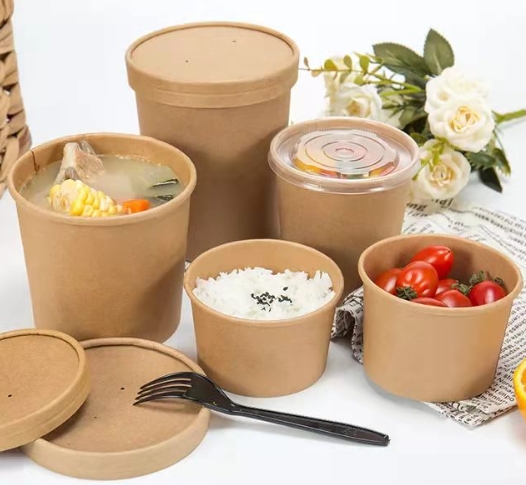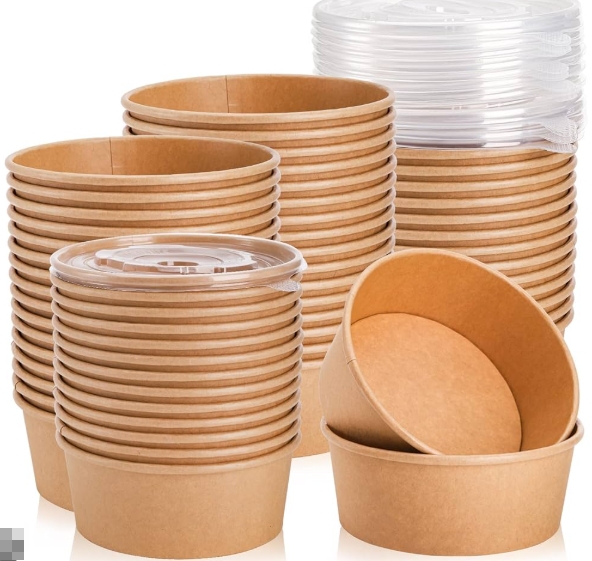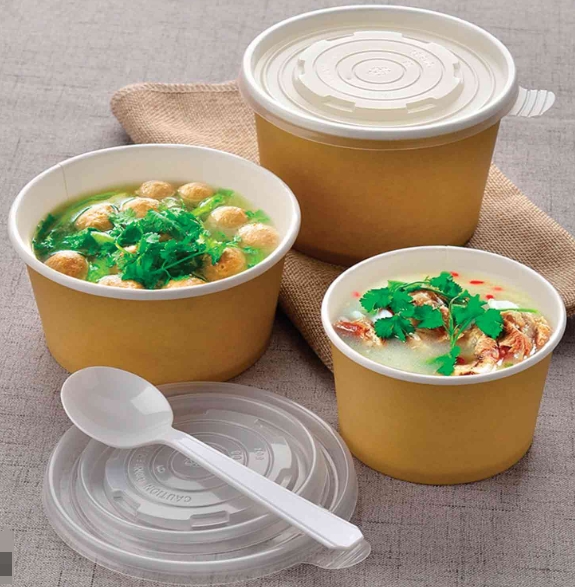
Content Menu
● Why Custom Bowl and Lid Sets Matter for Brand Packaging
>> Enhancing Brand Identity
>> Improving Customer Experience
>> Supporting Sustainability Goals
● Key Considerations When Choosing Custom Bowl and Lid Sets
>> Material Selection
>>> Paper and Cardboard
>>> Plastic
>>> Bamboo and Other Natural Fibers
>>> Glass and Ceramic
>> Design Customization
>>> Shape and Size
>>> Branding Elements
>>> Special Features
>> Functional Requirements
>>> Temperature Resistance
>>> Leak-Proof and Secure Fit
>>> Microwave and Freezer Compatibility
>> Sustainability and Environmental Impact
>>> Compostability and Recyclability
>>> Sourcing and Manufacturing Practices
>>> Reducing Packaging Waste
>> Supplier Evaluation
>>> Experience and Reputation
>>> Minimum Order Quantities and Lead Times
>>> Customization Capabilities
● The Process of Creating Custom Bowl and Lid Sets
>> Step 1: Define Your Needs
>> Step 2: Research Materials and Designs
>> Step 3: Collaborate with Designers
>> Step 4: Request Samples and Test
>> Step 5: Finalize Specifications and Place Order
● Customization Options to Consider
>> Printing Techniques
>> Finishes and Coatings
>> Embossing and Debossing
>> Window Cutouts
● Common Mistakes to Avoid
● The Impact of Packaging on Customer Perception
● Trends in Custom Bowl and Lid Packaging
>> Eco-Friendly Innovations
>> Minimalist Design
>> Personalization
● Conclusion
● FAQ
>> 1. What materials are best for custom bowl and lid sets?
>> 2. How can I ensure my custom bowls and lids are leak-proof?
>> 3. Is it possible to customize the shape and size of the bowls?
>> 4. What are the benefits of using sustainable packaging?
>> 5. How do I find a reliable supplier for custom bowl and lid sets?
In today's dynamic food and beverage industry, packaging has evolved beyond its traditional role of simply containing products. It now serves as a crucial element in branding, customer experience, and sustainability. Custom bowl and lid sets are at the forefront of this transformation, enabling businesses to distinguish themselves, ensure food safety, and meet the growing expectations of consumers. Whether you operate a restaurant, café, catering service, or food delivery business, selecting the right custom bowl and lid sets can significantly influence how your brand is perceived and how your offerings are enjoyed.
This comprehensive guide will walk you through the essential steps and considerations in choosing the ideal custom bowl and lid sets for your brand packaging. We will delve into material selection, design customization, functional requirements, sustainability, supplier evaluation, and the impact of packaging on customer experience. By the end of this article, you will be equipped with actionable insights to make informed decisions that align with your brand's values and business objectives.

Why Custom Bowl and Lid Sets Matter for Brand Packaging
Enhancing Brand Identity
Your packaging is often the first tangible interaction customers have with your brand. The design, color, and quality of your bowl and lid sets convey your brand's personality and values. Thoughtfully designed custom sets can make your brand memorable, foster customer loyalty, and set you apart from competitors in a crowded marketplace.
Improving Customer Experience
The right bowl and lid sets do more than protect food—they elevate the entire dining experience. Features such as easy-to-use lids, leak-proof construction, and ergonomic shapes contribute to customer satisfaction, especially for takeout and delivery services. Convenient and visually appealing packaging can turn a simple meal into a memorable experience.
Supporting Sustainability Goals
As environmental awareness grows, consumers increasingly favor brands that embrace eco-friendly packaging solutions. Choosing sustainable materials for your custom bowl and lid sets can enhance your brand reputation and attract environmentally conscious customers, helping you stand out as a responsible and forward-thinking business.
Key Considerations When Choosing Custom Bowl and Lid Sets
Material Selection
Paper and Cardboard
Paper-based bowls and lids are highly regarded for their biodegradability and recyclability. They are suitable for both hot and cold foods and can be coated to enhance durability and moisture resistance. These materials are a popular choice for brands that prioritize sustainability and a natural aesthetic.
Plastic
Plastic options, such as PET, PP, and PLA, offer excellent durability and clarity. Some plastics are compostable or recyclable, making them suitable for brands that value both performance and sustainability. Plastic bowls and lids are often chosen for their strength and versatility in various food applications.
Bamboo and Other Natural Fibers
Bamboo and other plant-based materials provide a unique, eco-friendly look and are fully compostable. They are ideal for brands seeking to project a natural and sustainable image, and they appeal to customers who value environmentally responsible packaging.
Glass and Ceramic
For premium products or dine-in experiences, glass and ceramic bowls with matching lids offer a reusable, high-end option. While less common for takeout, these materials can be used for specialty offerings or as part of a reusable packaging program.
Design Customization
Shape and Size
Consider the types of food you offer and select bowl shapes and sizes that best accommodate your menu items. Deep bowls work well for soups and salads, while shallow bowls are better suited for pastas and rice dishes. Offering a variety of sizes can also give customers more choices.
Branding Elements
Incorporate your logo, brand colors, and unique graphics on both the bowl and lid. Custom printing transforms ordinary packaging into a powerful marketing tool, making your brand instantly recognizable and reinforcing your identity with every order.
Special Features
Features such as vented lids, stackable designs, and easy-grip surfaces can enhance the functionality and convenience of your packaging. These thoughtful additions improve both staff efficiency and customer satisfaction.
Functional Requirements
Temperature Resistance
Ensure your bowl and lid sets can withstand the temperatures of your food offerings. Some materials are better suited for hot foods, while others perform best with cold or frozen items. Testing your packaging with actual menu items is essential.
Leak-Proof and Secure Fit
A tight seal between the bowl and lid is crucial to prevent spills during transport. Test samples to ensure the fit is reliable and easy to use, reducing the risk of messes and customer complaints.
Microwave and Freezer Compatibility
If your customers are likely to reheat or freeze their food, select materials that are safe for these purposes. Clear labeling can also help customers use your packaging correctly.
Sustainability and Environmental Impact
Compostability and Recyclability
Opt for materials that can be easily composted or recycled. Clearly label your packaging to inform customers about proper disposal methods, supporting your sustainability goals and educating your audience.
Sourcing and Manufacturing Practices
Work with suppliers who follow ethical sourcing and manufacturing practices. Certifications such as FSC, BPI, or OK Compost can provide assurance of sustainability and responsible production.
Reducing Packaging Waste
Choose designs that minimize material usage without compromising on strength or functionality. Consider offering reusable bowl and lid sets for loyal customers or as part of a loyalty program.
Supplier Evaluation
Experience and Reputation
Partner with suppliers who have a proven track record in producing high-quality custom packaging. Check reviews, request samples, and ask for references to ensure reliability and quality.
Minimum Order Quantities and Lead Times
Understand the supplier's minimum order requirements and production timelines. Planning ahead can help you avoid supply chain disruptions and ensure you have the packaging you need when you need it.
Customization Capabilities
Ensure your supplier can accommodate your design and branding needs, including color matching, printing techniques, and special features. Clear communication is key to achieving the desired results.

The Process of Creating Custom Bowl and Lid Sets
Step 1: Define Your Needs
Begin by analyzing your menu, customer preferences, and brand positioning. Identify the primary functions your packaging must serve, such as temperature retention, leak resistance, or visual appeal.
Step 2: Research Materials and Designs
Explore different material options and bowl shapes that align with your brand values and functional requirements. Look for inspiration in industry trends and competitor packaging.
Step 3: Collaborate with Designers
Work with packaging designers to create mockups that incorporate your branding elements. Consider how the design will look in real-world settings, both in-store and during delivery.
Step 4: Request Samples and Test
Before committing to a large order, request samples from potential suppliers. Test the bowls and lids with actual menu items to evaluate fit, durability, and customer usability.
Step 5: Finalize Specifications and Place Order
Once you are satisfied with the samples, finalize the specifications, including materials, sizes, printing details, and order quantities. Place your order and maintain clear communication with your supplier to ensure expectations are met.
Customization Options to Consider
Printing Techniques
- Offset printing for high-quality, full-color graphics
- Flexographic printing for large runs and simple designs
- Digital printing for small batches and variable data
Finishes and Coatings
- Matte or gloss finishes for visual effect
- Water-resistant or grease-resistant coatings for added functionality
Embossing and Debossing
Add texture and depth to your packaging with embossed or debossed logos and patterns, creating a tactile and memorable brand experience.
Window Cutouts
Showcase your food with clear windows, allowing customers to see the product inside while maintaining freshness and appeal.
Common Mistakes to Avoid
- Selecting materials that do not align with your brand's sustainability goals
- Overlooking the importance of a secure lid fit, leading to spills and customer dissatisfaction
- Ignoring local regulations regarding food packaging materials and labeling
- Failing to test packaging with actual menu items before full-scale production
- Neglecting to consider the end-of-life disposal of your packaging
The Impact of Packaging on Customer Perception
Packaging is often the first physical touchpoint between your brand and the customer. A thoughtfully designed custom bowl and lid set can create a sense of excitement, trust, and value. Customers are more likely to share positive experiences on social media when they receive attractive, functional packaging. On the other hand, poor packaging choices can result in negative reviews, food waste, and damage to your brand reputation.
Trends in Custom Bowl and Lid Packaging
Eco-Friendly Innovations
Brands are increasingly adopting compostable, biodegradable, and recyclable materials. Innovations such as plant-based plastics and water-based inks are gaining popularity as businesses seek to minimize their environmental impact.
Minimalist Design
Simple, clean designs with subtle branding are trending, appealing to modern consumers who appreciate understated elegance and clarity.
Personalization
Some brands offer personalized packaging options for special occasions, events, or loyalty programs, enhancing the customer experience and deepening brand engagement.
Conclusion
Choosing the right custom bowl and lid sets for your brand packaging is a strategic decision that influences customer satisfaction, brand identity, and environmental impact. By carefully considering materials, design, functionality, and supplier capabilities, you can create packaging that not only protects your products but also communicates your brand's values and commitment to quality. Stay informed about industry trends and continuously seek feedback from customers to refine your packaging strategy. With the right approach, your custom bowl and lid sets can become a powerful asset in building a memorable and successful brand.

FAQ
1. What materials are best for custom bowl and lid sets?
The best materials depend on your brand's priorities. Paper and cardboard are ideal for eco-friendly brands, plastic offers durability and clarity, while bamboo and other natural fibers provide a unique, sustainable look. Consider your food types, sustainability goals, and budget when choosing materials.
2. How can I ensure my custom bowls and lids are leak-proof?
Work closely with your supplier to test samples for fit and seal integrity. Look for designs with secure locking mechanisms and consider additional features such as vented lids for hot foods.
3. Is it possible to customize the shape and size of the bowls?
Yes, many suppliers offer a range of shapes and sizes, and some can create custom molds to match your specific needs. Customization options often include depth, diameter, and special features like handles or compartments.
4. What are the benefits of using sustainable packaging?
Sustainable packaging can enhance your brand's reputation, appeal to environmentally conscious customers, and help you comply with regulations. It also reduces your environmental footprint and can lead to cost savings in the long term.
5. How do I find a reliable supplier for custom bowl and lid sets?
Research suppliers with experience in food packaging, request samples, check reviews, and verify certifications. Clear communication about your requirements and expectations is key to a successful partnership.

















